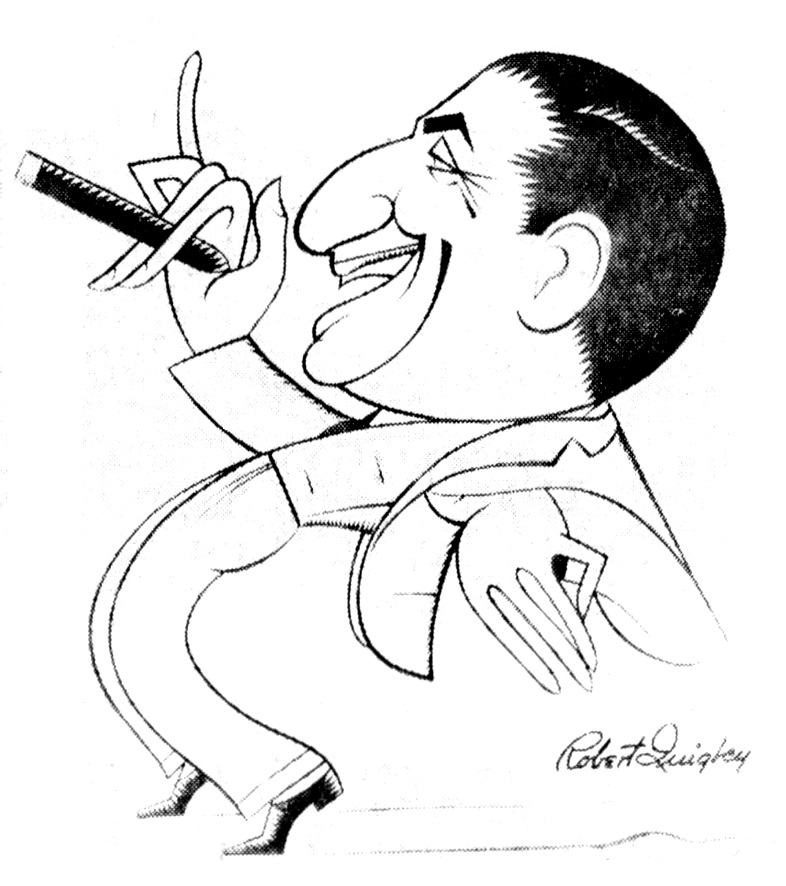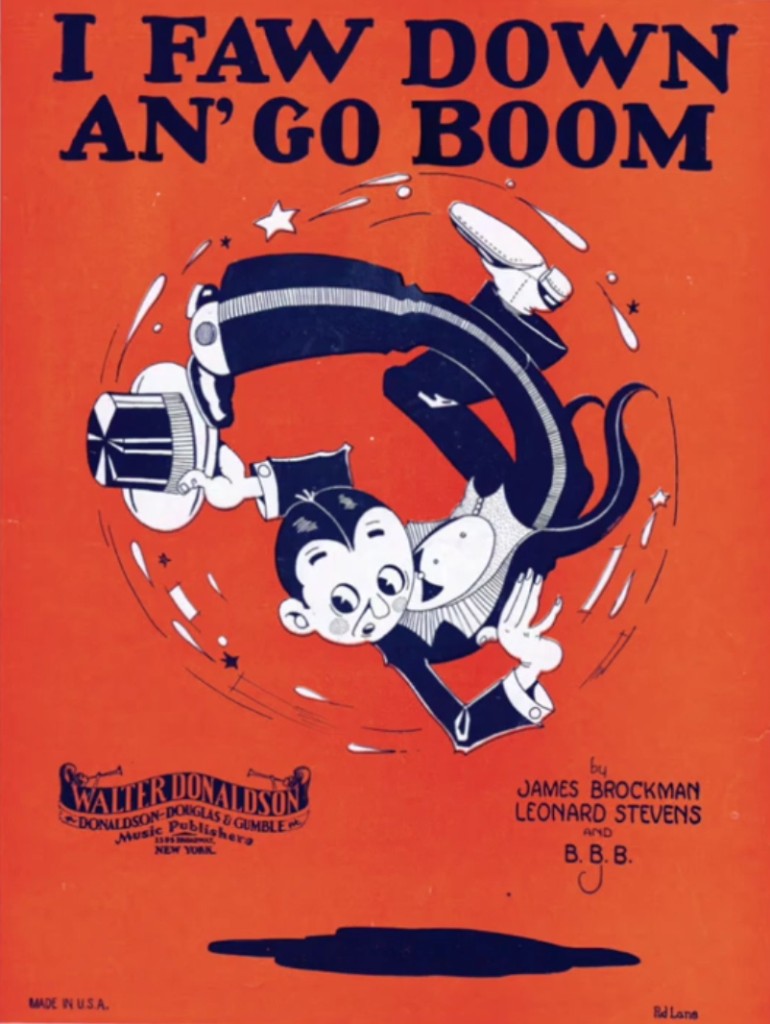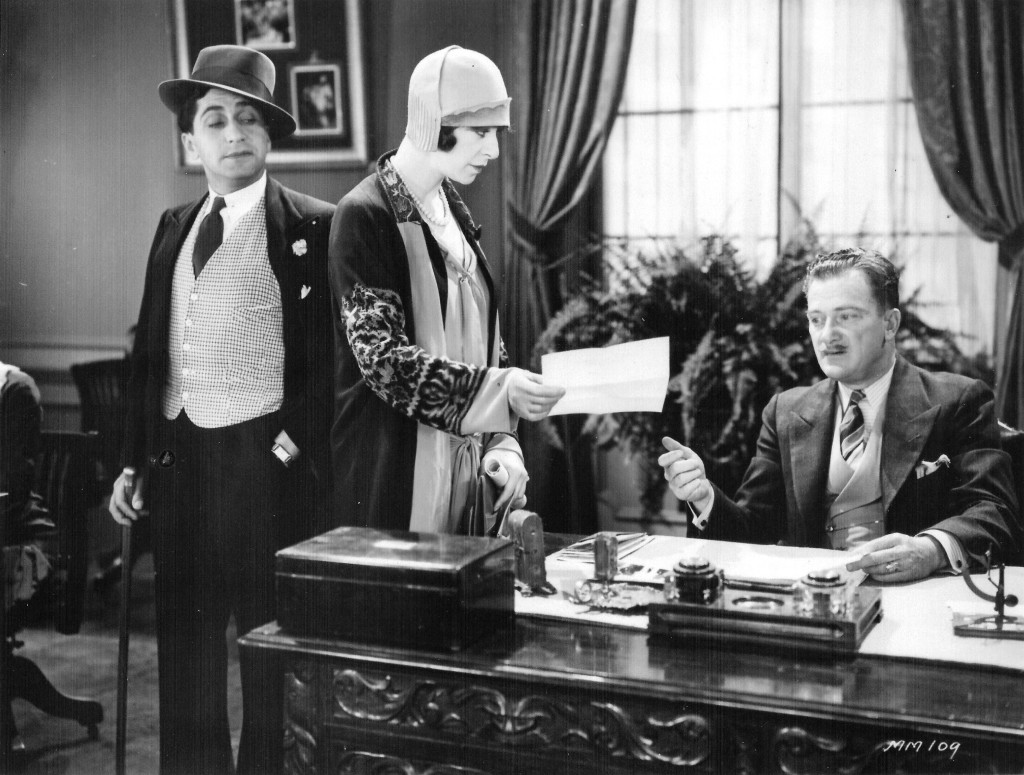From the 1920s to the 1940s my great uncle Harry Berman had a multifaceted career as a performer on stage, screen, records, and radio. His professional name was Bobby Burns Berman, but he was also known as B.B.B. or simply Bobby.
B.B.B. started out on the Keith-Orpheum Vaudeville circuit before he became a well known singer and comedian, composer, and actor, who worked in clubs and theaters across the country. He eventually started his own club in Los Angeles, B.B.B.’s Cellar Cafe, which entertained the Hollywood stars of the day.
Bobby’s older brother, my grandfather Henry Berman, was also a singer and stage performer. Their careers overlapped at various times, with each helping the other find work in their notoriously difficult field.
According to the recollections of people who knew him, Uncle Bobby was like many performers of that time, versatile and living by his wits and talent, always on the lookout for the next opportunity, wherever or whatever it was.
Vaudeville was still alive when he started his career but starting to wane. Bobby brought the skills of those traditions to his performances, while adding the latest pizazz as well. Mostly he was being himself, a true showman.
Bobby Berman started his career in a serious way on the Keith-Albee-Orpheum Vaudeville circuit. He was described by his contemporaries as “bubbling over with the latest japes and wisecracks,” an “underworld comedian,” and the “prince of submarine comedians.”
Despite his subversive reputation, B.B.B. was also a talented businessman who managed to keep his Cellar Cafe on Cosmo Street and Hollywood Boulevard going, from the height of Prohibition to the depth of The Great Depression and social backlash. This could not be said of many of his competitors. For example, Jimmy’s Backyard at the other end of Cosmo Street was shut down in 1933 for offering similar cross-dresser shows, a popular entertainment at the time. Although raided more than once, the Cellar Cafe managed to survive another year.
Music

(Cincinnati Inquirer Dec. 6, 1936)
Writing, recording, and singing were part of Bobby Berman’s repertoire of musical talent from the beginning of his career. His longest musical association was with the Montmartre Orchestra.
They joined together to produce several acoustical recordings that were cut for the Victor Talking Machine Company, which had just opened a record pressing plant in Oakland California in mid-1924.
By June of that year, B.B.B had gotten himself across the country from his engagement at the Cafe Martin In Atlantic City to record three 78s with Vincent Rose and His Montmartre Orchestra.
Bobby’s musical collaboration with the Monmartre Orchestra also extended to his appearance as the emcee and singer in several Vitaphone short subject films. By then Jackie Taylor had joined the Orchestra.
The Vitaphone shorts film numbers are 2291 and 2292. The song performed on Vitaphone reel 2291 are “My Little Dream Home On the Hill,” “Beneath Venetian Skies,” and “Just Once Again.” The songs performed on Vitaphone reel 2292 are “Blue River,” “Monte Carlo,” and “San.” Currently only mute prints of these films exist in the special collections of the Library of Congress. The accompanying sound disks are lost.
The Film Daily had an interesting take on these shorts. “Bobby Berman acts as emcee and he pulls a lot of hot cabaret style gagging that falls pretty flat.” Variety added “He looks and talks nice in his way, but that way is too cabaretish for backwoods consumption. Also could stand a haircut, not so much in the back as around the sides. In introducing instrumental specialties, B.B.B. writes his own lyrics. Best number in the item.”
Music In His Club
The Montmartre Orchestra would appear in B.B.B.’s Cellar Cafe as part of a series of continuing engagements from 1929 to 1933. An idea of the kind of show Bobby put on can be gained from this article in the Hollywood Filmograph magazine (Feb. 11, 1933):
“B.B.B. himself puts over some new song and dance numbers and acts as M.C.—and what a showman that fellow is. He called upon Nat Spector to sing, Jerry Lester to clown, Billy Taft to dance, Jean Malin and Fred Monroe to strut their stuff, all impromptu—and what a show they put on. Marv Land and his orchestra did their darnedest to whoop it up and Leonard Stevens at the piano more than helped to put the whole affair across like only he can. The opening of the new show was attended by the best known folks in every walk of life in and around Hollywood. And what more can B.B.B. or anyone ask; we ask you?”
“I Faw Down an’ Go Boom” and Other Compositions
 B.B.B. wrote or collaborated on the lyrics to a number of popular songs, including “Cuttin’ Out Paper Dolls,” “Western Moon,” “Listen to the Jingle of the Slot Machines,” and “Dance of the Wooden Dolls.”
B.B.B. wrote or collaborated on the lyrics to a number of popular songs, including “Cuttin’ Out Paper Dolls,” “Western Moon,” “Listen to the Jingle of the Slot Machines,” and “Dance of the Wooden Dolls.”
Perhaps his most famous collaboration was “I Faw Down an’ Go Boom,” the 1928 hit that was recorded by almost every singer of the time, including Eddie Cantor. B.B.B. even got involved in politics, in his own unique way, as evidenced by these quotes from the Hollywood Filmograph magazine (June 7 and 21, 1930).
“Oh, yes—we shouldn’t forget the monarch of subterranean comedy, the inimitable B.B.B., fairly bubbling over with the latest japes, innuendoes, and quirks of wisdom. He was one of Jimmy Hall’s party, setting ’em all into convulsions of laughter with his new song, dedicated to [Lt. Gov.] Buron Fitts, ‘For the Love of Pete.’”
“The first bombshell was exploded in the [California] Governor race at the Alexandria Hotel Friday when almost a thousand loyal boosters broke bread with Mayor Rolph [of San Francisco]. They sang a song specially written by B.B.B. and Leonard Stevens boosting him for the highest office in the state.”
Singing Parts in Movies
B.B.B. is known to have sung in three movies. Wide Open (Warner Brothers, 1930) with Edward Everett Horton. A cabaret scene in the lost film Father’s Advice (Metropolitan Studios, 1930) “afforded BBB ’solo opportunities’ as a night club entertainer.”

Perhaps most famously he appeared as a “song and dance man” with Fannie Brice in her first taking picture, My Man (Vitaphone, 1928). Unfortunately no prints of the film are known to exist. The Vitaphone system sound disks have survived. Bobby Berman can be heard fast singing his one song “Stay Out of the South,” composed by Harold Dixon. His accent is very much where he was originally from, old school ’Noo Yawk,’ much like Fanny Brice.
B.B.B. On Stage
In 1932 Bobby Berman appeared in a stage production of the Gershwin musical Girl Crazy at the Pantages Theater in Los Angeles. He played the same part in a previous production at the Biltmore Theater. Mr. Berman had a singing role in the show which featured Ginger Rogers, who reprised her star turn from the original 1930-31 Broadway production.
In his absence, B.B.B.’s Cellar Cafe was hosted by his friend Al Rosen until Mr. Berman had finished his three month show engagement.
The Boswell Sisters
From 1925 to 1927 when Bobby Berman wasn’t busy in New York, Chicago or Los Angeles, he worked in New Orleans at the Little Club, Silver Slipper, and Club Forest. During his time in New Orleans he became friends with a relatively unknown singing trio called The Boswell Sisters who worked in some of the same clubs that he did.
By 1929 Bobby had established his own club. The Boswell Sisters had also moved to L.A. to advance their careers and were invited to perform at his Cellar Cafe. This showcased their considerable talent and gave them exposure to influential people in Hollywood.
“Through B.B.B. the Boswell Sisters met Lou Dorn of MGM, who gave them a tryout and put them in a picture…” (The Boswell Legacy by Kyla Titus, page 93)
Bobby also helped them secure a spot to perform on Los Angeles radio station KFWB where he had his own program. It didn’t hurt that the studio was owned by Warner Brothers and located on their lot.
Non-show Business Career
An interesting sidelight of Bobby Berman’s life, both during and after his show business career, was as a nationally known dog show judge and Schnauzer enthusiast.
According to the Cincinnati Inquirer (December 6, 1936) “In the army during the World War B.B.B. was in charge of the dogs used in connection with the Chemical Warfare Service. He made 22 trips to Europe importing dogs, and introduced the Schnauzer at the 1920 Madison Square Garden Show.”
The author would like to acknowledge the enormous assistance provided by his friend David McCain.
Adam G. Burlock is the grand nephew of Bobby Burns Berman. Mr. Burlock grew up in Virginia hearing stories from his mother about her musical and theatrical family. Mr. Burlock has been on the trail of B.B.B. since the 1980s when he moved to California. He is currently a resident of Oregon.






















